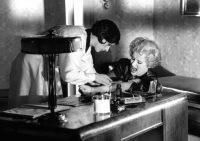Newsletter February 2022

The Berlinale, Berlin’s international film festival, opens tomorrow with a screening of François Ozon’s new film, a loose adaptation of Fassbinder’s 1972 play “The Bitter Tears of Petra von Kant,” which RWF also filmed himself. Presumably, PETER VON KANT will not only deviate from the original in terms of details but also invest it with a self-reflexive quality. The titular fashion designer has been replaced by a film director, and in his white suit lead actor Denis Ménochet is suspiciously reminiscent of RWF. Hanna Schygulla, who starred in the 1972 film version, also appears in a supporting role. The film is Ozon’s second Fassbinder adaptation following WATER DROPS ON BURNING ROCKS (2000). More information about the film is available on the Berlinale website:
https://www.berlinale.de/en/programme/programme/detail.html?film_id=202203414
From 16 to 23 February, the Cinémathèque Française in Paris is showing a retrospective dedicated to filmmaker Daniel Schmid, who died in 2006. Schmid and Fassbinder met in 1966 while applying to the German Film and Television Academy in Berlin (DFFB) – unlike RWF, Schmid ended up getting a place. While the Swiss director made brief appearances in Fassbinder films such as THE MERCHANT OF FOUR SEASONS (1972) and LILI MARLEEN (1981), Fassbinder took the lead role in Schmid’s SHADOW OF ANGELS (1976) – which in turn was based on RWF’s play “Der Müll, die Stadt und der Tod” (Garbage, the City and Death). The Cinémathèque Française is showing twelve of Schmid’s films, including a documentary on the master of melodrama Douglas Sirk, whom Fassbinder also revered. More information about the series is available here: https://www.cinematheque.fr/cycle/daniel-schmid-626.html
On 23 January, film architect Rolf Zehetbauer passed away at the age of 92. Among his most elaborate and best-known works are the two Wolfgang Petersen films DAS BOOT (1981) and THE NEVERENDING STORY (1984). Zehetbauer remained extremely busy throughout his five-decade career, collaborating with world-famous directors such as Ingmar Bergman and Robert Aldrich, winning an Oscar for Bob Fosse’s Berlin musical CABARET (1972), and designing the sets for Fassbinder films such as DESPAIR (1978) and QUERELLE (1982).
In an obituary for Zehetbauer published in the Frankfurter Allgemeine Zeitung, Maria Wiesner writes of the film architect with a love of detail: “The more complicated the material, the more he enjoyed his work. It seemed to make no difference whether he had to work on contemporary material or delve deep into the past, for example […] in order to marry the harsh light and shadow play of expressionist cinema with the interior design aesthetic of the 1950s for Rainer Werner Fassbinder’s black-and-white drama VERONIKA VOSS (1982).” The full article can be found here: https://www.faz.net/aktuell/feuilleton/rolf-zehetbauer-zum-tod-des-oscar-gewinners-und-filmarchitekten-17767908.html
Since Christmas, we have lost several important figures. They include the internationally renowned actor Hardy Krüger, who once turned down the role of the sadistic Helmut in Fassbinder’s melodrama MARTHA (1974), and the opinionated Ilse “Ponkie” Kümpfel-Schliekmann, who became famous as a film critic for the Munich Abendzeitung. In an interview conducted in 2015, she revealed a pragmatic view of her profession: “Viewers always either want to read a confirmation of their own opinion or want to get upset. In this respect, […] film criticism is also simply ‘reading material’ in which the reader is reflected.” (The whole conversation can be found at Artechock: https://www.artechock.de/film/text/interview/p/ponkie_2015.html).
Ponkie was particularly fond of Fassbinder’s films. When FOX SND HIS FRIENDS (1975) was released, she wrote of the film:: “Where others only have an experience, Fassbinder forges a film – always with his (splendid) regular crew, always with his undisguised love of the trivial, of the folk play with artfully simple naive language, in which banal sentences suddenly stand out like brands.”
Ponkie also championed the Bavarian painter and director Herbert Achternbusch, who died on 10 January. Like Fassbinder, Achternbusch, with his anarchic, hard-to-categorize films, was an outsider in the New German Cinema movement. Cosima Lutz, who wrote a beautiful obituary for the “Welt,” finds Achternbusch’s work to be “as close to documentary as it is to peep-box theater.” He measures out the cosmic absurdity of his films, which range from “mere corniness to literally the deepest abyss,” with subversions. The entire obituary can be read at:
https://www.welt.de/kultur/kino/article236226284/Nachruf-Herbert-Achternbusch-Sein-Gespenst-erschreckte-den-Minister.html?fbclid=IwAR0KdkA4Xzh5_sICfuBTiVtO8bwDG1oMhQSIBvtZe0o64A12gb8rlxwcwBI
Among the actors who appeared in front of the camera for both Achternbusch and Fassbinder was Margarethe von Trotta, who later became known as a director. In the recently published book “Gegenwärtig sein: Gespräche mit Thilo Wydra” (Being Present: Conversations with Thilo Wydra), she looks back at her life, talks about associates such as Volker Schlöndorff and RWF, and about her admiration for Ingmar Bergman and Alfred Hitchcock. More information about the publication can be found on the Kampa Verlag website:
https://kampaverlag.ch/margarethe-von-trotta-gegenwaertig-sein/
We wish our readers and friends the very best and will return again soon with more news from the world of Rainer Werner Fassbinder.
More on the films of Rainer Werner Fassbinder:
https://www.fassbinderfoundation.de/filme-von-fassbinder/?lang=en
More on the stage plays of Rainer Werner Fassbinder:
http://www.fassbinderfoundation.de/theaterstucke/?lang=en
Photo left: Denis Ménochet in François Ozon‘s PETER VON KANT © C. Bethuel / FOZ
Photo right: Rolf Zehetbauer’s set design in VERONIKA VOSS © RWFF / Leo Weisse